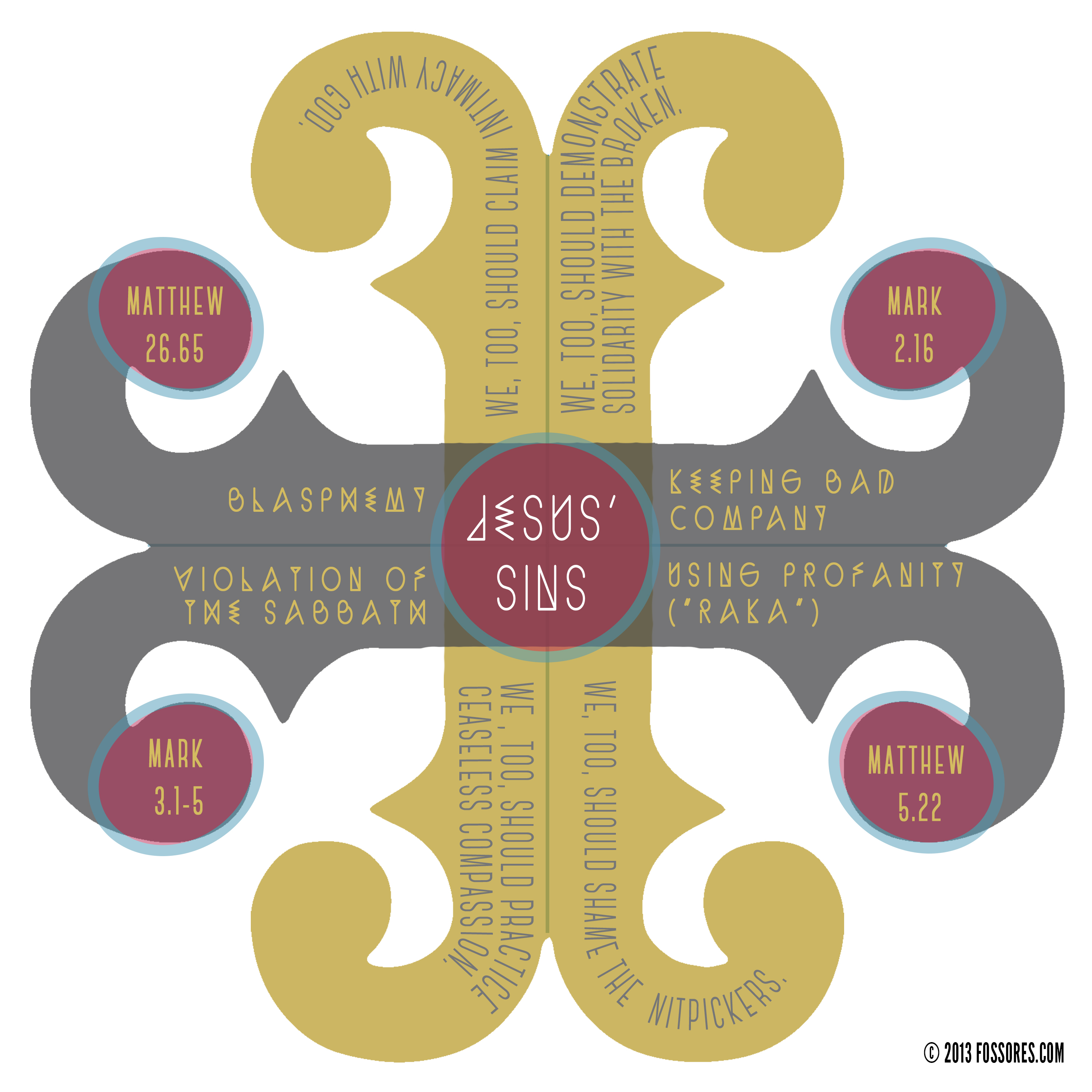Despite the fact that we hold to the doctrine of Christ’s perfection, his contemporaries did not. In fact, Jesus’ strongest opponents were religious people who felt like he was giving himself license to sin and behave outside of the moral and ethical boundaries of Judaism. Jesus sinned in at least four ways: he blasphemed, he violated the Sabbath, he kept bad company and became corrupt as a result, and he used profanity in the term raka.
Jesus considered himself to be one with God. The Jews considered this blasphemy and this was the reason he was executed. However, the ways Jesus talked about communion with God had far broader applications than simply his own consubstantiality with the Father. In fact, Jesus talked about us becoming God’s, citing Psalm 82, to reference the fact that we are made by God to be like God. Please note this does not mean that we have equality with God, but simply that we share in God, much like Peter says that we are participants in the divine nature and Paul says in 2 Corinthians we are changed from glory to glory. Jesus’ sin was blasphemy—not only the blasphemous claim that he himself was God, but the equally blasphemous implication that we, through him, become God’s.
Jesus’ second sin was the violation of the Sabbath, as evidenced by his healing of the paralytic on this holy day. To defend himself, Jesus cites the story about David’s warriors going into the temple and eating the show bread, the consecrated bread set aside for the purposes of worship. Jesus’ defense is a clever one. By aligning himself with the greatest of Israelite kings, he puts his opponents in a position where they will have to condemn King David and which will also condemn Christ. Jesus clearly means for them to understand—and us—that “man was not made for the Sabbath. The Sabbath was made for man.”
The history of the Sabbath is itself, fascinating. We have no command to honor the Sabbath until after the Exodus. During the time of Israelite enslavement they were forced to work seven days a week in Egypt. The Egyptians were superstitious about the seventh day and believed that was when most evil things happened. As a result they made the Jews work so they could rest and ostensibly be protected from those evil spirits. When God leads them out of Egypt in the Exodus, he tells them they’re going to honor the seventh day of the week and keep it holy because A) our lives should not be about ceaseless labor and B) an earlier reference to the Sabbath, in the Creation account in Genesis chapter One. In Genesis One, all of the first six days of Creation have a beginning and an end, but the seventh day of Creation, the day when God rests, has a beginning but no end. The entire point of the Genesis account concerning the seventh day of Creation is that we are meant to live in a perpetual state of rest and worship with God where we enjoy Creation. In fact, our jobs and our work are meant to be a manifestation of that enjoyment, not an interruption of it. In effect, Jesus is saying to his opponents that they have missed the point of the Sabbath completely. It’s more work to keep the Sabbath, in their way of thinking, than it is to break it.
Jesus’ third sin was the use of the term raka in Matthew 22. He says, cautioning his bloodthirsty opponents, that anyone who says raka is in danger of hellfire, meaning that the hate inside of us can so consume us as to undo the work of righteousness to which we have devoted our lives. Many translators render raka as “you fool.” However, this misses the full force of the term. It’s actually a very profane term and has all the force of our most inappropriate profanities. It’s not difficult to imagine that Jesus’ opponents, upon hearing Jesus use the term raka, would have pointed the finger and wondered how far gone he truly was.
Jesus’ final sin was consorting with bad company and being corrupted by them as a result. Everything Jesus did with women was sinful. Every conversation he had with a woman was deeply inappropriate for both Jews and secularists in his day. Jesus’ proximity to lepers and tax collectors and zealots was equally condemnable behavior, and yet Jesus refused to accept the charges leveled against him that he was a glutton or a pervert or a winebibber simply by virtue of the fact that he kept company with prostitutes.
I think we ought to sin like Jesus. Jesus blasphemed. Jesus violated the Sabbath. Jesus used bad words. Jesus hung around bad people. But I think what Jesus was really doing in each of those moments was claiming incredible intimacy with God, practicing ceaseless compassion, shaming the nitpickers, and demonstrating solidarity with outcasts. If we are to be little Christs—Christians—people called by the name and marked by the Spirit of Jesus; if we are to be people in whom his Spirit dwells, modeling our lives after him, then let us be so bold as to sin in the same ways our sinless Lord did.
Let us claim radical intimacy.
Let us practice ceaseless compassion.
Let us shame nitpickers.
Let us stand on the side of the least, the last, the lost, and the lonely.
fossores
Related posts
Categories
Category Cloud
Tag Cloud
Recent Posts
- Victors and Victims November 6, 2018
- 3 Hacks for Happiness October 29, 2018
- Hope Against Death September 20, 2018
- The Shape Of The Cross September 19, 2018


